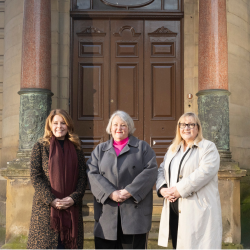-
Study
-
Undergraduate
- Search for a Course
- Undergraduate Open Day & Events
- Application Guides
- Northumbria University UCAS Exhibitions
- Foundation Years
- Undergraduate Fees & Funding
- School & College Outreach
- Continuing Professional Development
-
Postgraduate
- Postgraduate Study Degree
- Postgraduate Research Degrees
- Postgraduate Open Days and Events
- Postgraduate Fees & Funding
- Flexible Learning
- Thinking about a Masters?
- Continuing Professional Development
- Change Direction
-
Student Life
- The Hub - Student Blog
- Accommodation
- Life in Newcastle
- Support for Students
- Careers
- Information for Parents
- Students' Union
- Northumbria Sport
- Be Part of It
-
-
International
International
Northumbria’s global footprint touches every continent across the world, through our global partnerships across 17 institutions in 10 countries, to our 277,000 strong alumni community and 150 recruitment partners – we prepare our students for the challenges of tomorrow. Discover more about how to join Northumbria’s global family or our partnerships.
View our Global Footprint-
Applying to Northumbria
- European Union
- Our London Campus
- Northumbria Pathway
- International Events
- Entry Requirement and Education Country Agents
- Global Offices
-
Northumbria Language Centre
- Faculty Requirements
- Acceptable English Requirements
- Pre-sessional English Language and Study Skills
- Academic Language Skills Programmes (ALS)
-
International Fees, Funding & Scholarships
- International Undergraduate Fees
- International Undergraduate Funding
- International Masters Fees
- International Masters Funding
- International Postgraduate Research Fees
- International Postgraduate Research Funding
- International Money Matters
-
Life at Northumbria
- International student support
- Careers
-
International Mobility
- Current Northumbria Students
- Incoming Exchange Students
-
-
Business
Business
The world is changing faster than ever before. The future is there to be won by organisations who find ways to turn today's possibilities into tomorrows competitive edge. In a connected world, collaboration can be the key to success.
More on our Business Services -
Research
Research
Northumbria is a research-rich, business-focused, professional university with a global reputation for academic quality. We conduct ground-breaking research that is responsive to the science & technology, health & well being, economic and social and arts & cultural needs for the communities
Discover more about our Research -
About Us
-
About Northumbria
- Our Strategy
- Our Staff
- Place and Partnerships
- Student Profiles
- Alumni Profiles
- Leadership & Governance
- Academic Departments
- University Services
- History of Northumbria
- Contact us
- Online Shop
-
-
Alumni
Alumni
Northumbria University is renowned for the calibre of its business-ready graduates. Our alumni network has over 246,000 graduates based in 178 countries worldwide in a range of sectors, our alumni are making a real impact on the world.
Our Alumni - Work For Us
What will I learn on this module?
Building on the topics covered in year one, and on your clinical experience, the module will enhance your understanding of the diversity of midwifery roles and models of care, in particular those which facilitate continuity of care and carer. You will further develop the communication, leadership and critical thinking skills required to meet the Future Midwife Standards and contribute to delivery of the Better Births agenda and beyond.
With an emphasis on innovation and leadership, you will explore and analyse the evidence base which informs differing models of care, including continuity of carer, identifying opportunities and challenges. You will reflect on and critique the application of health policy within the maternity services, with a specific focus on the personalised care agenda and what this means for women and midwives. You will also consider health policy outside the UK and global maternal and neonatal health. Debates, such as about place of birth, will be developed with reflection on practice experience and the place of professional bias and advocacy in facilitating choice. Human rights and ethics which inform health care provision and how these are applied to informed choice, consent and shared decision making will be explored. Inclusive practice will be examined, and cultural awareness developed further to address inequalities in women’s experiences and outcomes. Perspectives on inequality such as critical theory and feminism will inform your learning.
The principles of leadership and innovation from a personal, professional, and organisational perspective will be discussed, with a focus on working with others and building effective working practices and relationships within and across professional boundaries. How organisations and individuals can manage change to improve the quality of services will also be explored, with a focus on collaborative models of stakeholder and service user engagement in leading, planning, evaluating and improving services.
The module will encourage you to think critically yet creatively, in a solution-focused way, about how to enhance care and women and families’ experience of it. This will require you to reflect on emotional intelligence and apply sociological and psychological theories to facilitate effective communication and relationship building. It will also include consideration of how to share information around health education and promotion, particularly with vulnerable or perceived disengaged or hard to reach client groups. These approaches will further develop your awareness of yourself as both innovator and communicator, and encourage you to build your capability through feedback and information sharing. This will feed into the module assessment, through an oral presentation to your peers of a proposal for practice innovation, which will form the basis of your dissertation project in year three.
How will I learn on this module?
On this module you will engage with a variety of teaching and learning strategies including lectures, seminars and directed learning. Activities will be blended to create a mix of face to face and online activities supported by the University’s Electronic Learning Platform (eLP), Blackboard Ultra. Women and families’ voices and experiences will be integral to learning activities within the module. Practice scenarios which illustrate women’s journeys and use women’s stories will aid in the application of theory and enable you to understand the woman’s perspective, and regional service user groups invited to participate in the module content and assessment. Lectures will introduce key concepts. These will then be further explored within seminars and workshops, designed to facilitate collaborative learning, developing your inquiry and communication skills, and to signpost further reading and learning activities. Peer learning and feedback opportunities will also enable you to reflect on the skills and attributes required to engage women, their partners and social support networks, building positive relationships which respect the diversity of contemporary family life.
How will I be supported academically on this module?
The academic staff involved in delivering this module will also provide guidance, to ensure that you are able to confidently engage with the module content. Learning materials, including directed and e-learning will be made available on the eLP. Seminars will form an opportunity for peer support and feedback throughout the module, helping you to develop the evaluation and feedback skills required for effective professional practice and lifelong learning. You will also receive formative feedback from academic staff informally during seminars, to enable you to review your learning in a safe and supportive environment. Group and individual tutorials will further support preparation for the module assessment.
In addition, the module will be supported by University library staff and resources, including study skills support packages. You can access the interactive training via the library webpages or the following link: http://library.northumbria.ac.uk/learning-skills
Ask4Help online (accessed through your student portal) provides a comprehensive range of answers to frequently asked questions and is of benefit to students as a central point of reference for information about many different topics. Ask4Help face to face service points include that located at Coach Lane Library (ground floor).
What will I be expected to read on this module?
All modules at Northumbria include a range of reading materials that students are expected to engage with. Online reading lists (provided after enrolment) give you access to your reading material for your modules. The Library works in partnership with your module tutors to ensure you have access to the material that you need.
What will I be expected to achieve?
You will be expected to:
Knowledge & Understanding:
1) Critically appraise the principles of leadership and innovation within maternity care, reflecting the legal and ethical expectations of midwives.
2) Critique approaches to change and service improvement within midwifery, and the role of stakeholders in enabling quality measurement and enhancement.
Intellectual / Professional skills & abilities:
3) Demonstrate capability in the application of research and service evaluation strategies to facilitate improvements in the care of women and families.
4) Demonstrate effective communication skills to facilitate change and innovative practice in midwifery which is sensitive to diverse needs and able to challenge inequalities.
Personal Values Attributes (Global / Cultural awareness, Ethics, Curiosity) (PVA):
5) Critically reflect on the interpersonal skills required to build effective relationships with women, families and other stakeholders which enhance care.
How will I be assessed?
Formative Assessment
Ongoing feedback will be available from tutors throughout the module. Seminars and assessment tutorials will utilise peer and tutor feedback to discuss proposed topics and the evidence base for the proposal, and to develop the skills required for your presentation.
Summative Assessment
A 30 minute presentation outlining a practice innovation proposal, to meet the learning outcomes of the module (100%)
MLO 1, 2, 3, 4, 5.
Written feedback will be provided via Turnitin.
Pre-requisite(s)
N/A
Co-requisite(s)
N/A
Module abstract
This module builds on your year one learning and practice experience to focus on innovation in midwifery practice, and the skills required to facilitate this. Your knowledge of models of midwifery care, particularly those focussed around continuity of carer, is broadened and deepened, and you are encouraged to question and challenge assumptions around current care provision. Leadership and change management skills and knowledge are introduced and effective communication skills developed further. You will develop your capability in relation to critiquing the evidence base for current practice, and there is a continued focus on enabling relationships and building capability in yourself and the women and families you care for. The module will be assessed through an oral presentation to your peers of a proposal for practice innovation, which will form the basis of your dissertation project in year three of the MSc.
Course info
Credits 20
Level of Study Postgraduate
Mode of Study 3 years Full Time
Department Nursing, Midwifery & Health
Location Coach Lane Campus, Northumbria University
City Newcastle
All information is accurate at the time of sharing.
Full time Courses are primarily delivered via on-campus face to face learning but could include elements of online learning. Most courses run as planned and as promoted on our website and via our marketing materials, but if there are any substantial changes (as determined by the Competition and Markets Authority) to a course or there is the potential that course may be withdrawn, we will notify all affected applicants as soon as possible with advice and guidance regarding their options. It is also important to be aware that optional modules listed on course pages may be subject to change depending on uptake numbers each year.
Contact time is subject to increase or decrease in line with possible restrictions imposed by the government or the University in the interest of maintaining the health and safety and wellbeing of students, staff, and visitors if this is deemed necessary in future.
Useful Links
Find out about our distinctive approach at
www.northumbria.ac.uk/exp
Admissions Terms and Conditions
northumbria.ac.uk/terms
Fees and Funding
northumbria.ac.uk/fees
Admissions Policy
northumbria.ac.uk/adpolicy
Admissions Complaints Policy
northumbria.ac.uk/complaints














